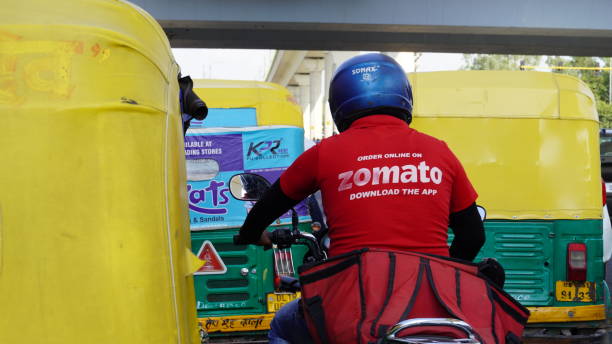In today’s interconnected world, where convenience often comes in the form of doorstep deliveries, incidents like the recent Zomato theft in Bengaluru serve as stark reminders of the vulnerabilities that can accompany such services. Caught on CCTV, a Zomato delivery agent was recorded pilfering a food package left at a customer’s doorstep, triggering widespread concern and debate.
The incident came to light when journalist Aditya Kalra shared the CCTV footage on social media, highlighting how the delivery agent first completed his assigned delivery before noticing another package nearby. Seemingly aware of the opportunity, he surreptitiously picked up the second package and left the scene without notifying anyone.
In response to the public outcry, Zomato swiftly issued an apology through their official social media channels, expressing regret over the incident and promising to take decisive action against those involved. Such incidents not only tarnish the reputation of delivery services but also erode the trust of customers who rely on these platforms for convenience and reliability.
This episode is not an isolated one. Similar incidents involving delivery personnel have been reported in the past, underscoring a systemic issue that demands attention. Just a few months ago, a Swiggy delivery agent was caught on camera stealing a pair of Nike shoes from a doorstep in Gurugram during a delivery. These occurrences highlight a disturbing trend where the very individuals entrusted with ensuring the safe delivery of goods are sometimes the ones compromising it.
The fallout from such incidents extends beyond mere inconvenience. Customers are left questioning the security protocols of these delivery giants and wondering about the efficacy of measures taken to safeguard their orders. For many, the ease of ordering food or goods online is now coupled with concerns over whether their deliveries will arrive intact and on time.
In the wake of the Zomato theft, social media platforms buzzed with discussions about the broader implications for delivery services. Some users expressed disillusionment, citing similar experiences with early morning delivery companies. Such anecdotes serve to underscore the need for robust oversight and accountability within the industry.
In their response, Zomato reassured the public that they take such matters seriously and urged affected customers to provide order details for immediate investigation. This proactive approach is crucial in rebuilding trust and demonstrating a commitment to rectifying lapses in service.
Beyond immediate damage control, these incidents prompt a broader conversation about how delivery companies can enhance their training and vetting processes for personnel. Background checks, ethics training, and stringent adherence to delivery protocols are all essential components in mitigating the risk of theft and ensuring customer confidence.
Moreover, these incidents highlight the importance of technological interventions such as GPS tracking and real-time monitoring of deliveries. These tools not only aid in ensuring the timely arrival of orders but also provide transparency and accountability in cases where incidents occur.
As delivery services continue to evolve and expand, maintaining trust and security remains paramount. Companies like Zomato and Swiggy must continually reassess and reinforce their protocols to address vulnerabilities and uphold the integrity of their services.
In conclusion, while the Zomato theft incident in Bengaluru has sparked concerns and debate, it also presents an opportunity for the delivery industry to reevaluate its practices and prioritize customer trust. By adopting proactive measures, leveraging technology, and maintaining transparent communication, companies can mitigate risks, enhance security, and ensure that incidents like these are minimized in the future.
